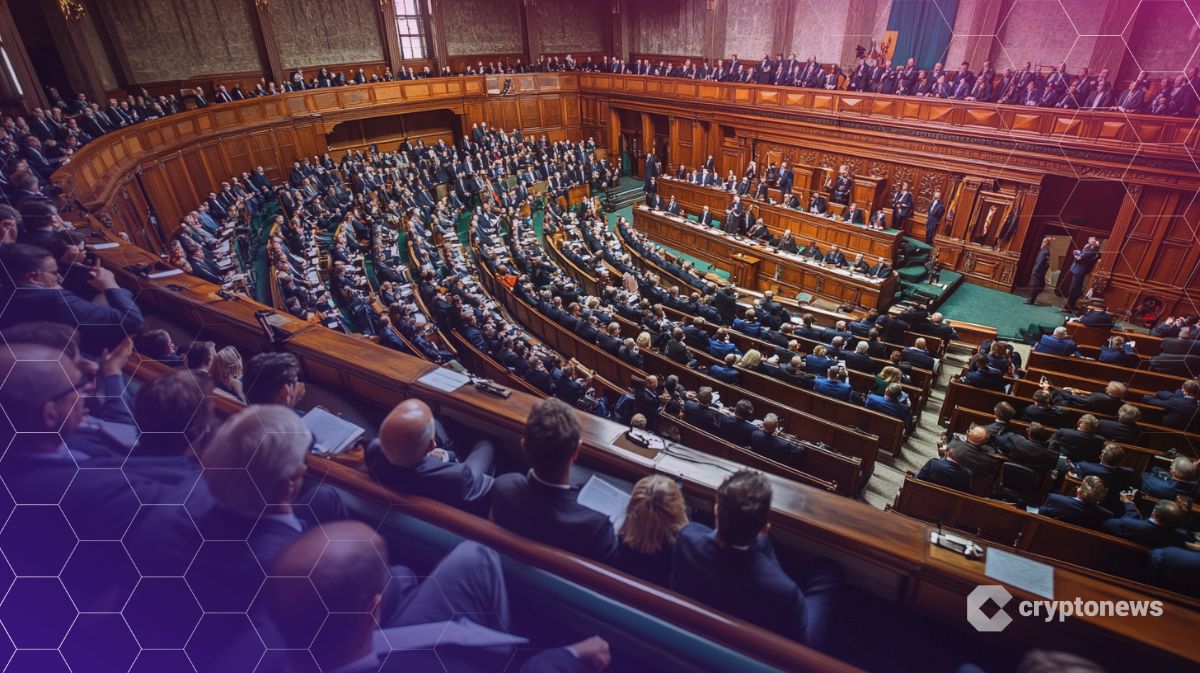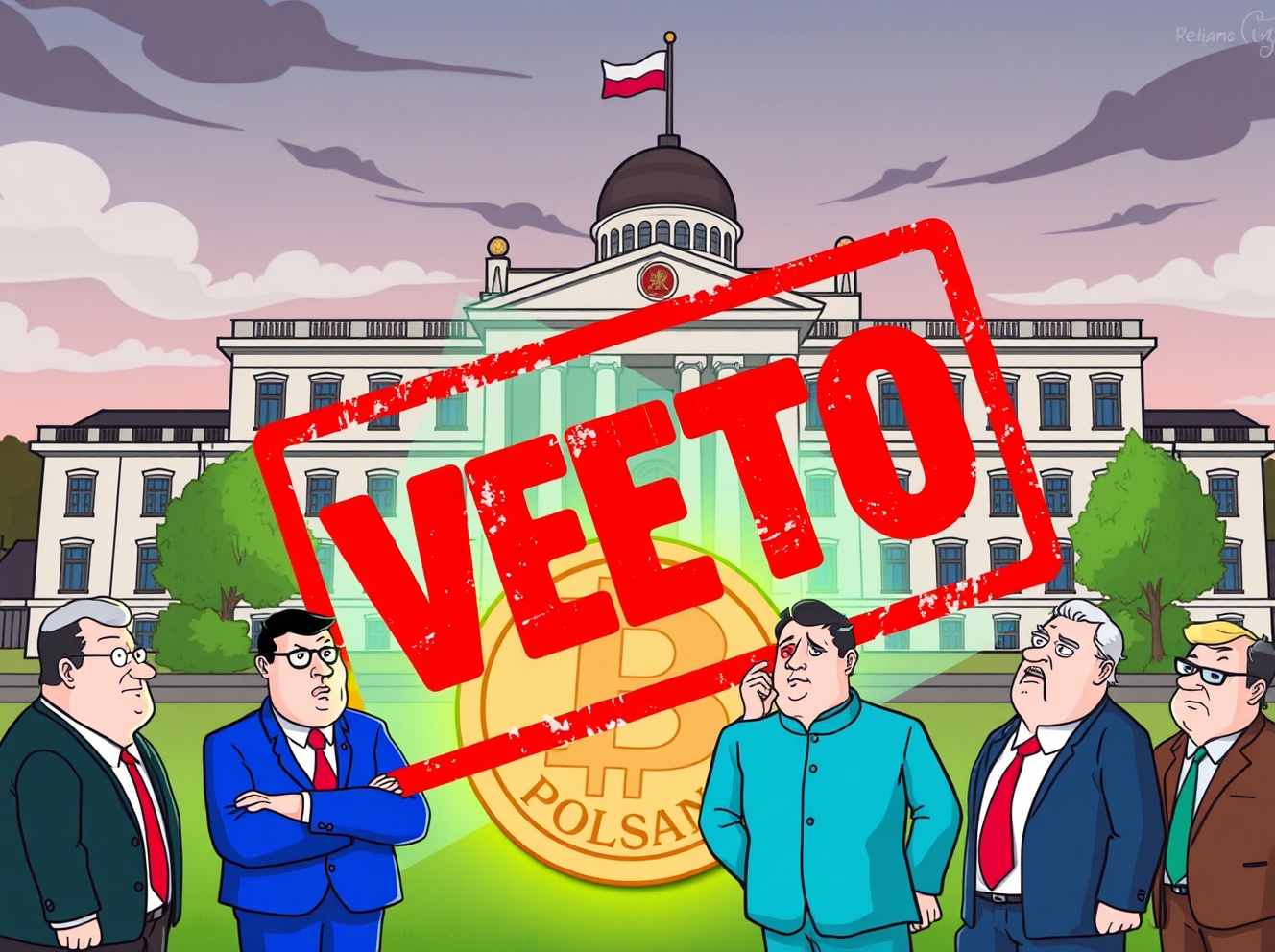Poland Moves Toward Strictest Crypto Rules in EU Amid Fierce Public Backlash

Share:
Poland is edging closer to enacting one of Europe’s toughest crypto laws after the Sejm, the lower house of parliament, approved a government-backed bill aligning national rules with the EU’s Markets in Crypto-Assets Regulation (MiCA).
The bill, first submitted in June, moved quickly through parliamentary procedures. After an initial reading in July, it was reviewed by the Public Finance Committee and returned with amendments in September. The second reading took place on Sept. 24, followed immediately by the third reading, which cleared the way for Friday’s vote.
The measure, known as the Crypto-Asset Market Act (Bill 1424), passed on September 26 with 230 votes in favor, 196 against, and no abstentions. It now advances to the Senate for review.
Poland Passes Strict New Crypto Law Threatening 3 Million Users With Jail Time and $2.8M Fines
The legislation designates the Polish Financial Supervision Authority (KNF) as the country’s primary crypto regulator, giving it sweeping oversight powers.
All crypto-asset service providers (CASPs), including exchanges, issuers, and custodians, both foreign and domestic, must secure a KNF license to operate.
Applicants will need to demonstrate strong capital buffers, compliance systems, risk management protocols, and anti-money laundering procedures. A six-month transition period would be granted once the law takes effect. Violations could bring fines up to 10 million zlotys ($2.8 million) or prison terms of up to two years.
Supporters of the law, led by rapporteur Krystyna Skowrońska of the Civic Coalition (KO), argue it is essential to protect investors, stabilize Poland’s rapidly growing digital asset market, and ensure compliance with EU-wide standards.
Proponents say the measures will bring legitimacy to an industry often criticized for its opacity while shielding Poland from systemic risks.
However, the proposal has ignited significant controversy. Opposition lawmakers and industry voices warn the bill could cripple Poland’s crypto sector, which counts an estimated three million users.
Even more, from the opposition party, the Law and Justice party (PiS) announced it will draft an alternative proposal modeled on lighter frameworks in other EU states, with plans to present the details at its program congress in Katowice in late October.
Polish Lawmakers Slam Crypto Bill as “Most Restrictive in EU,” Warn of Startup Exodus
Janusz Kowalski of the Law and Justice (PiS) party labeled the legislation “the largest and most restrictive cryptocurrency law in the EU.” He highlighted its length, noting that Germany’s MiCA implementation runs 78 pages, while Slovakia and Lithuania each needed just 22, and Cyprus only one.
Critics argue that Poland’s version goes beyond MiCA’s requirements, burdening companies with excessive bureaucracy and costs.
Tomasz Mentzen, leader of the Confederation party, criticized the decision to empower the KNF, pointing out its notoriously slow licensing process averaging 30 months, the longest in the EU. Mentzen and other opposition lawmakers claim this will create bottlenecks, discourage startups, and push businesses abroad.
Confederation MP Krzysztof Rzońca has called on President Karol Nawrocki to veto the bill, warning that it would “dismantle the domestic cryptocurrency market.”
The political debate has exposed deep divides. The Civic Coalition, Poland 2050-TD, PSL-TD, the Left, and Together backed the legislation, while PiS, Confederation, and Republicans voted against it.
Notably, the bill has also sparked strong reactions within Poland’s crypto community. Industry advocates and investors have raised concerns that the strict framework could drive businesses abroad, weakening Poland’s position in Europe’s digital economy.
Critics argue that Poland risks missing out on job creation and investment if regulations discourage startups and exchanges from operating locally.
Prominent Bitcoin supporter Dominik Fel echoed these concerns, warning that Poland risks turning into a “museum of innovation” if the law takes effect. He described the legislation as a defective policy that is widely recognized as harmful and called for broader public mobilization to pressure the president into rejecting it.
The presidential role will be pivotal. While President Nawrocki has not publicly revealed his stance, opposition figures are lobbying him to reject the measure.
Though he does not personally hold cryptocurrencies, his victory earlier this year was partly supported by libertarian and pro-Bitcoin groups who expect him to adopt a lighter regulatory touch.
Analysts suggest his decision could set the tone for Poland’s future approach, either positioning the country as a leader in cautious but investor-friendly oversight or as a jurisdiction at risk of stifling its growing digital economy.
The post Poland Moves Toward Strictest Crypto Rules in EU Amid Fierce Public Backlash appeared first on Cryptonews.
Poland Moves Toward Strictest Crypto Rules in EU Amid Fierce Public Backlash

Share:
Poland is edging closer to enacting one of Europe’s toughest crypto laws after the Sejm, the lower house of parliament, approved a government-backed bill aligning national rules with the EU’s Markets in Crypto-Assets Regulation (MiCA).
The bill, first submitted in June, moved quickly through parliamentary procedures. After an initial reading in July, it was reviewed by the Public Finance Committee and returned with amendments in September. The second reading took place on Sept. 24, followed immediately by the third reading, which cleared the way for Friday’s vote.
The measure, known as the Crypto-Asset Market Act (Bill 1424), passed on September 26 with 230 votes in favor, 196 against, and no abstentions. It now advances to the Senate for review.
Poland Passes Strict New Crypto Law Threatening 3 Million Users With Jail Time and $2.8M Fines
The legislation designates the Polish Financial Supervision Authority (KNF) as the country’s primary crypto regulator, giving it sweeping oversight powers.
All crypto-asset service providers (CASPs), including exchanges, issuers, and custodians, both foreign and domestic, must secure a KNF license to operate.
Applicants will need to demonstrate strong capital buffers, compliance systems, risk management protocols, and anti-money laundering procedures. A six-month transition period would be granted once the law takes effect. Violations could bring fines up to 10 million zlotys ($2.8 million) or prison terms of up to two years.
Supporters of the law, led by rapporteur Krystyna Skowrońska of the Civic Coalition (KO), argue it is essential to protect investors, stabilize Poland’s rapidly growing digital asset market, and ensure compliance with EU-wide standards.
Proponents say the measures will bring legitimacy to an industry often criticized for its opacity while shielding Poland from systemic risks.
However, the proposal has ignited significant controversy. Opposition lawmakers and industry voices warn the bill could cripple Poland’s crypto sector, which counts an estimated three million users.
Even more, from the opposition party, the Law and Justice party (PiS) announced it will draft an alternative proposal modeled on lighter frameworks in other EU states, with plans to present the details at its program congress in Katowice in late October.
Polish Lawmakers Slam Crypto Bill as “Most Restrictive in EU,” Warn of Startup Exodus
Janusz Kowalski of the Law and Justice (PiS) party labeled the legislation “the largest and most restrictive cryptocurrency law in the EU.” He highlighted its length, noting that Germany’s MiCA implementation runs 78 pages, while Slovakia and Lithuania each needed just 22, and Cyprus only one.
Critics argue that Poland’s version goes beyond MiCA’s requirements, burdening companies with excessive bureaucracy and costs.
Tomasz Mentzen, leader of the Confederation party, criticized the decision to empower the KNF, pointing out its notoriously slow licensing process averaging 30 months, the longest in the EU. Mentzen and other opposition lawmakers claim this will create bottlenecks, discourage startups, and push businesses abroad.
Confederation MP Krzysztof Rzońca has called on President Karol Nawrocki to veto the bill, warning that it would “dismantle the domestic cryptocurrency market.”
The political debate has exposed deep divides. The Civic Coalition, Poland 2050-TD, PSL-TD, the Left, and Together backed the legislation, while PiS, Confederation, and Republicans voted against it.
Notably, the bill has also sparked strong reactions within Poland’s crypto community. Industry advocates and investors have raised concerns that the strict framework could drive businesses abroad, weakening Poland’s position in Europe’s digital economy.
Critics argue that Poland risks missing out on job creation and investment if regulations discourage startups and exchanges from operating locally.
Prominent Bitcoin supporter Dominik Fel echoed these concerns, warning that Poland risks turning into a “museum of innovation” if the law takes effect. He described the legislation as a defective policy that is widely recognized as harmful and called for broader public mobilization to pressure the president into rejecting it.
The presidential role will be pivotal. While President Nawrocki has not publicly revealed his stance, opposition figures are lobbying him to reject the measure.
Though he does not personally hold cryptocurrencies, his victory earlier this year was partly supported by libertarian and pro-Bitcoin groups who expect him to adopt a lighter regulatory touch.
Analysts suggest his decision could set the tone for Poland’s future approach, either positioning the country as a leader in cautious but investor-friendly oversight or as a jurisdiction at risk of stifling its growing digital economy.
The post Poland Moves Toward Strictest Crypto Rules in EU Amid Fierce Public Backlash appeared first on Cryptonews.
 Platforma Obywatelska Donalda Tuska niszczy rynek kryptoaktywów w Polsce i uderza w 3 miliony Polaków posiadających kryptowaluty.
Platforma Obywatelska Donalda Tuska niszczy rynek kryptoaktywów w Polsce i uderza w 3 miliony Polaków posiadających kryptowaluty.  Polska implementacja unijnego rozporządzenia MiCA (Markets in Crypto-Assets…
Polska implementacja unijnego rozporządzenia MiCA (Markets in Crypto-Assets…  Poland has elected Karol Nawrocki, a conservative who says crypto should be “born in freedom, not buried in red tape.”
Poland has elected Karol Nawrocki, a conservative who says crypto should be “born in freedom, not buried in red tape.”









